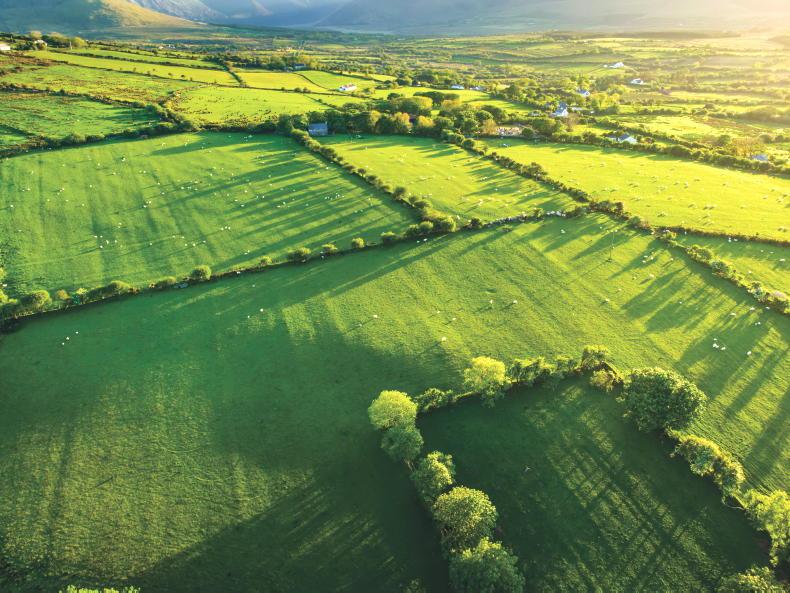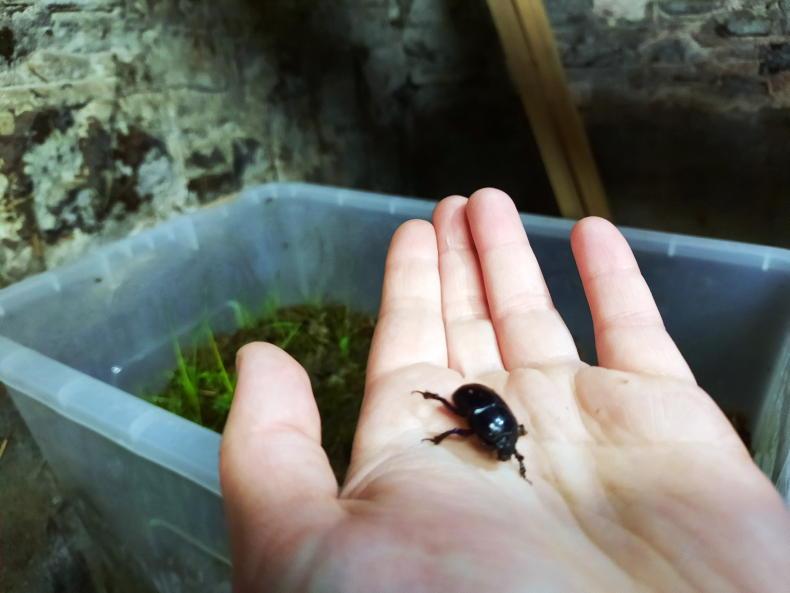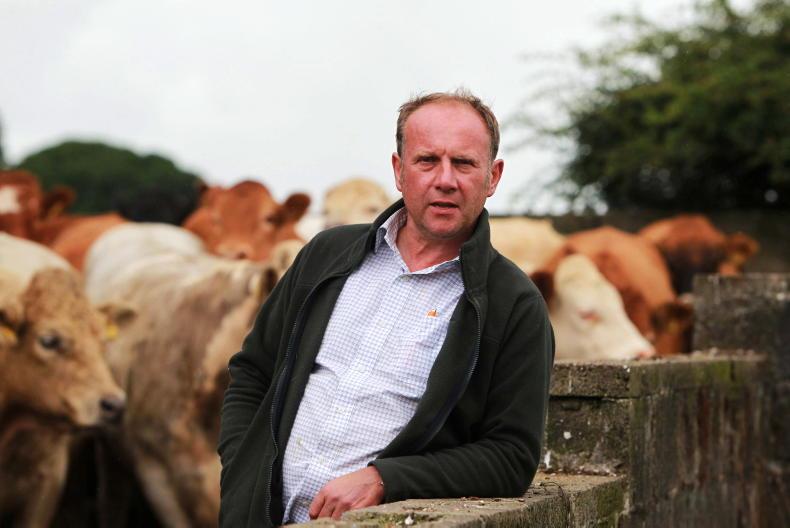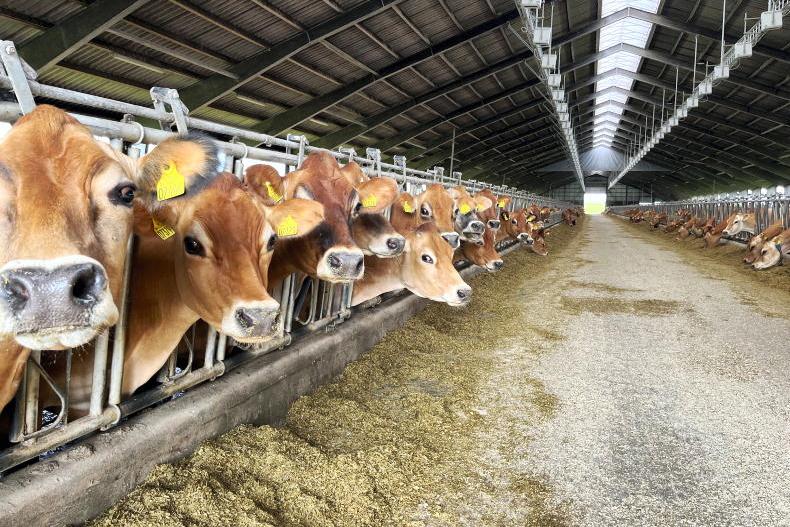As we enter into the new year, times of change in agriculture are ahead of us. In reality, agriculture is constantly changing and adapting and change can be a good thing.
In this Focus, we visited two farmers tackling very different challenges on their farms, but both are beneficially impacting on the environmental, economic and social aspects of their farms.
Bruce Thompson from Co Laois is working to improve his animals’ immune systems, reduce his medicine bills and improve biodiversity and soil health on the farm.

Dung beetles on Bruce Thompson's farm.
A traffic light system and dung beetles help to implement this plan and could help to reduce resistance buildup to wormers.
Paul Moore is from Midleton, Co Cork. He is a conventional tillage and beef farmer and is also a member of BirdWatch Ireland.
Small changes are helping to increase the bird population and overall biodiversity on his farm.
Paul talks about the decline in bird numbers associated with tillage and the importance of over-winter stubble for some species, which is about to become a thing of the past if the new Nitrates Action Programme gets the go ahead.
These farmers are both improving biodiversity on their farms. We often hear that we are in a biodiversity crisis.
Farmers are an easy target when it comes to biodiversity loss, but these farmers are positively impacting biodiversity on their farms and it is important that everyone plays their part in the bid to increase and improve biodiversity. This includes farmers, consumers and legislators.
As an example, the new Nitrates Action Programme requires that cultivation takes place within seven or 14 days of harvesting a cereal crop, depending on the situation.
Green cover on tillage land can no doubt have a benefit to reducing nitrate loss to water, but the loss of over-winter stubble will leave a number of birds without a habitat or land to forage on over the winter time. What will happen to these species?
Balance
We must remember that all decisions have consequences and sustainability is all about balance.
What is good for economics is not always good for work-life balance or good for the environment and, likewise, sometimes what is good for the environment is not always good for economics.
Maybe legislators need to listen more to the farmers, maybe consumers need to make more informed decisions in the supermarket, maybe farmers can do more, but all have roles to play in the biodiversity crisis.
Both of these farmers are carrying out a number of simple practices, which can be implemented on farms across the country. Not every farmer will start to breed dung beetles, but they can make practical decisions on where their young animals graze.
Challenges lie ahead in 2022, but challenges often result in great discoveries or beneficial changes in practices. It is the farmers who will be innovative and adapt to these challenges. Paul and Bruce are great examples of this.
As we enter into the new year, times of change in agriculture are ahead of us. In reality, agriculture is constantly changing and adapting and change can be a good thing.
In this Focus, we visited two farmers tackling very different challenges on their farms, but both are beneficially impacting on the environmental, economic and social aspects of their farms.
Bruce Thompson from Co Laois is working to improve his animals’ immune systems, reduce his medicine bills and improve biodiversity and soil health on the farm.

Dung beetles on Bruce Thompson's farm.
A traffic light system and dung beetles help to implement this plan and could help to reduce resistance buildup to wormers.
Paul Moore is from Midleton, Co Cork. He is a conventional tillage and beef farmer and is also a member of BirdWatch Ireland.
Small changes are helping to increase the bird population and overall biodiversity on his farm.
Paul talks about the decline in bird numbers associated with tillage and the importance of over-winter stubble for some species, which is about to become a thing of the past if the new Nitrates Action Programme gets the go ahead.
These farmers are both improving biodiversity on their farms. We often hear that we are in a biodiversity crisis.
Farmers are an easy target when it comes to biodiversity loss, but these farmers are positively impacting biodiversity on their farms and it is important that everyone plays their part in the bid to increase and improve biodiversity. This includes farmers, consumers and legislators.
As an example, the new Nitrates Action Programme requires that cultivation takes place within seven or 14 days of harvesting a cereal crop, depending on the situation.
Green cover on tillage land can no doubt have a benefit to reducing nitrate loss to water, but the loss of over-winter stubble will leave a number of birds without a habitat or land to forage on over the winter time. What will happen to these species?
Balance
We must remember that all decisions have consequences and sustainability is all about balance.
What is good for economics is not always good for work-life balance or good for the environment and, likewise, sometimes what is good for the environment is not always good for economics.
Maybe legislators need to listen more to the farmers, maybe consumers need to make more informed decisions in the supermarket, maybe farmers can do more, but all have roles to play in the biodiversity crisis.
Both of these farmers are carrying out a number of simple practices, which can be implemented on farms across the country. Not every farmer will start to breed dung beetles, but they can make practical decisions on where their young animals graze.
Challenges lie ahead in 2022, but challenges often result in great discoveries or beneficial changes in practices. It is the farmers who will be innovative and adapt to these challenges. Paul and Bruce are great examples of this.












SHARING OPTIONS